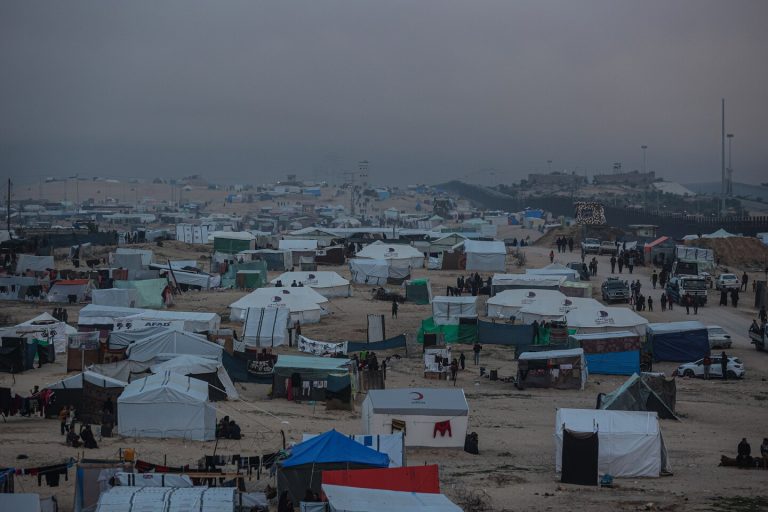The confrontation represents a test of Israel's most important alliances. Egyptian officials have threatened to suspend the peace agreement signed between the two countries 40 years ago if the attack on Rafah forces refugees to cross the border. New footage obtained by The Washington Post suggests they are preparing for such a scenario. President Biden said the United States would not support a large-scale attack on Rafah unless Israel could implement a “credible plan” to evacuate civilians in the line of fire.
“Many people have been displaced there — displaced multiple times… and now they are packed into Rafah — exposed and vulnerable,” Biden said on Monday. “They need to be protected.”
Israel is struggling to reconcile international calls to protect the innocent with demands from internal extremists to strike a decisive blow at Hamas militants stationed in the last population center in Gaza. Prime Minister Benjamin Netanyahu vowed again on Wednesday to attack Rafah, saying Hamas had woven its remaining brigades, weapons and smuggling routes throughout the city.
Yahya Sinwar, the mastermind of the October 7 attacks that killed about 1,200 people and led to the capture of more than 250 hostages, is Israel's main target, and Israel believes he may have withdrawn to Rafah.
Netanyahu ordered his commanders to develop plans to move civilians out of harm's way, but participants in the discussions acknowledged that practical options were still out of reach. An Israeli official said that planning for the evacuation was underway, but that a final plan had not been approved. Like others in this story, they spoke on the condition of anonymity to discuss sensitive matters.
An Israeli proposal to create a series of camps along Gaza's Mediterranean coast that could accommodate more than 350,000 tents did not placate critics when it was recently presented in Cairo, according to another person familiar with the discussions. A State Department spokesman said on Monday that the United States had not yet seen a credible evacuation plan from Israel.
The source added that the Israeli army recognizes the need to reduce civilian suffering. But senior political leaders insist that confronting Hamas in Rafah is vital to achieving Israel's war goal of “destroying” the militant group.
“They are trying hard to find a middle ground,” the person said. “They have to go to Rafah because they have to go after Sinwar. But they cannot kill thousands of civilians knowing that they have to provide humanitarian aid. “There are no good solutions.”
The evacuation plan put forward by Israel in Cairo calls for the establishment of 15 seaside camps, each containing 25,000 tents, according to the person familiar with the discussions, extending north of Al-Mawasi. Israel has promoted the western coastal region as a “safer area” since November, although it has continued to target the area. At least seven people were killed in an air strike on a makeshift camp there last month, according to a hospital director.
Military analysts said that Israel intends to request assistance from Egypt in providing health care and other assistance in the camps, and that its location opens the possibility of providing aid from the sea.
But the United Nations agency for Palestinian refugees has never established a presence in Mawasi. Tamara Al-Rifai, a spokeswoman for UNRWA, said the possibility of hundreds of thousands of people seeking refuge there “will require the United Nations and humanitarian workers to establish new camps far from any existing buildings.”
Israeli authorities are seeking to dismantle UNRWA, the main aid provider in Gaza, claiming that at least 12 of its employees were involved in the Hamas-led attacks on October 7. UNRWA said it was investigating these allegations, which prompted the United States and other major countries to dismantle it. Donors to stop funding the organization.
The person familiar with the matter said another Israeli proposal under consideration seeks to keep civilians away from Rafah by directing aid through the now-closed Israeli Erez crossing, near Gaza City, and allowing families to return to the north. The area has been devastated by months of air attacks and ground fighting, but it is estimated that more than 100,000 Gazans are still there, and many in the south are keen to return to what remains of their communities.
But the idea faced immediate political opposition within the security cabinet, according to the person familiar with the discussions. “Why should Gazans be allowed to return to their homes when Israelis still cannot return to their homes,” the person said, describing the main objection. More than 300,000 Israelis are still displaced from towns along the Gaza and Lebanon borders.
While international mediators in Cairo continue to work to secure a halt to the fighting and the release of the Israeli hostages, some Israeli political commentators have suggested that Netanyahu's threats against Rafah are a diplomatic ploy aimed at pressuring Hamas to accept the deal.
But panic is already spreading among the displaced in Rafah. After the Israeli army raid on Monday that killed at least 67 Palestinians while rescuing two Israeli hostages, thousands of people packed up their cars or headed out on foot.
Ibrahim Al-Rayes said as he dismantled the tent in which he and his family from Gaza City have been living for three months: “There is no safe place in all areas of the Gaza Strip, but some places are less dangerous than others.” He did not know where he would stay next.
Ghada Abed, 31, who arrived in Rafah after following Israeli directives to head further south, is now looking for a new haven.
“Our desire is to return to our home in Jabalia [in northern Gaza]“Despite the devastation, we hope to live in a tent there, either adjacent to our house or inside our neighborhood,” she said Tuesday.
Wherever the displaced go, Cairo is determined to keep them in Gaza. Egyptian media reported that the Egyptian army reinforced the border with armored vehicles and more than thirty tanks.
Last December, Netanyahu's threat to control the Rafah border crossing set off alarm bells in Cairo. Egyptian officials warned that any Israeli movement within the Philadelphia Corridor — a restricted zone about nine miles long and several hundred yards wide that extends from the southernmost tip of the Gaza Strip to the Mediterranean Sea — would threaten the 1979 Egyptian-Israeli peace treaty, This agreement was reached in 1979. It served as a cornerstone of stability in the region.
Egypt fears that the influx of Palestinians could destabilize North Sinai, a sensitive military region where its army recently spent a decade fighting an Islamist insurgency.
Cairo also opposes the displacement of Palestinians to Sinai for political reasons, and refuses to be complicit in what President Abdel Fattah al-Sisi describes as “the liquidation of the Palestinian cause” – or the permanent mass exodus of Gazans from the Strip.
But a report released this week by the UK-based Sinai Foundation for Human Rights, which has a monitoring team in North Sinai, indicated that Egyptian authorities are establishing an area to house Palestinian refugees who have crossed the border.
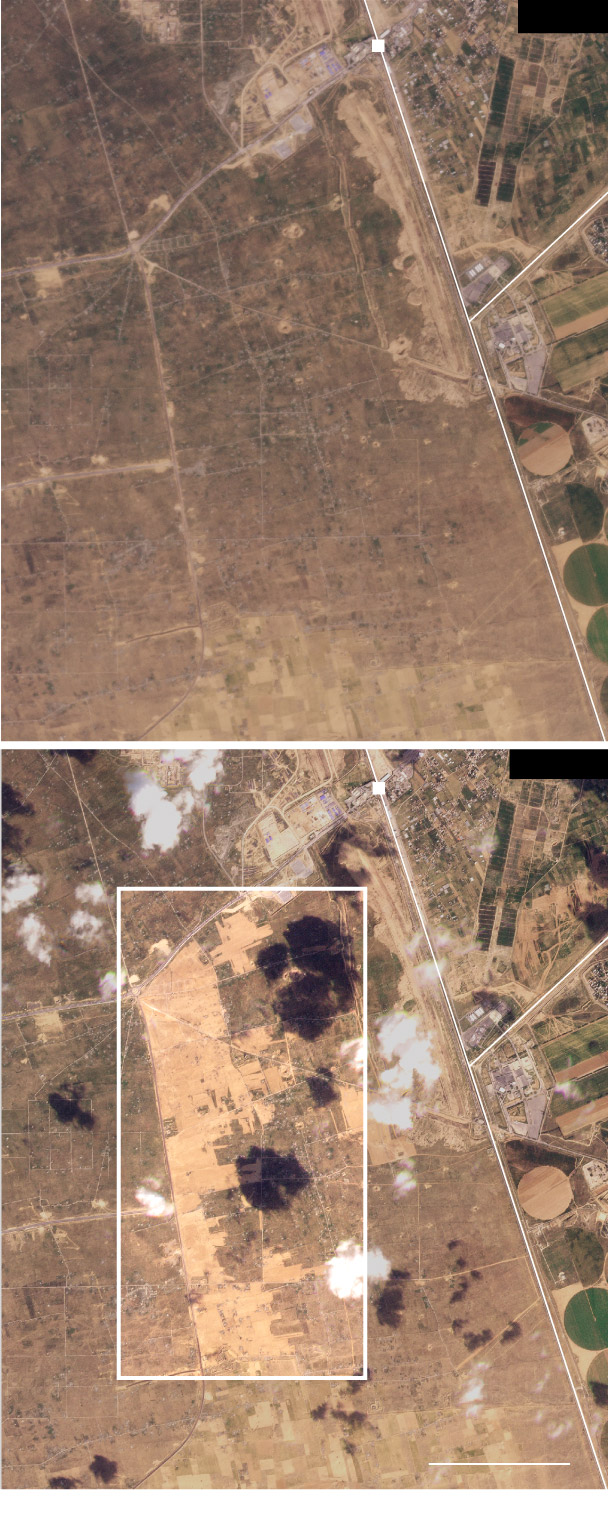
Satellite © Planet Labs 2024
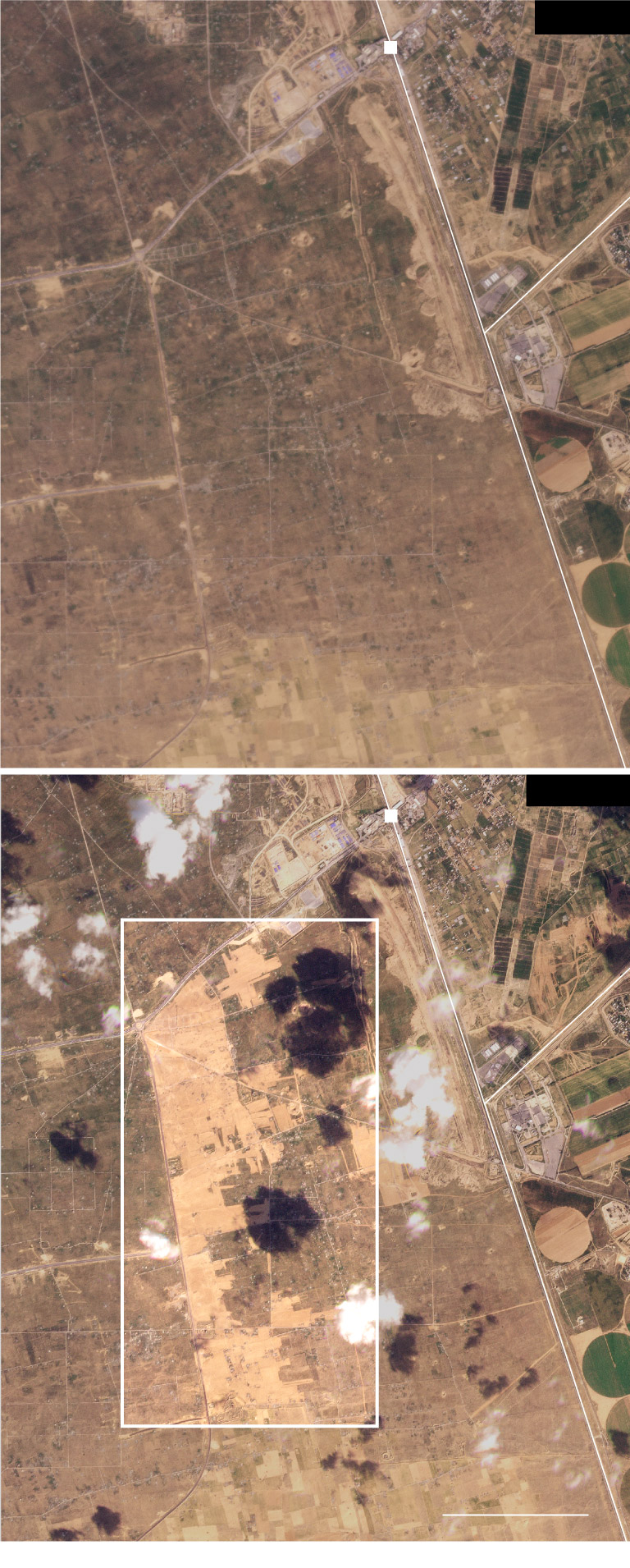
Satellite © Planet Labs 2024
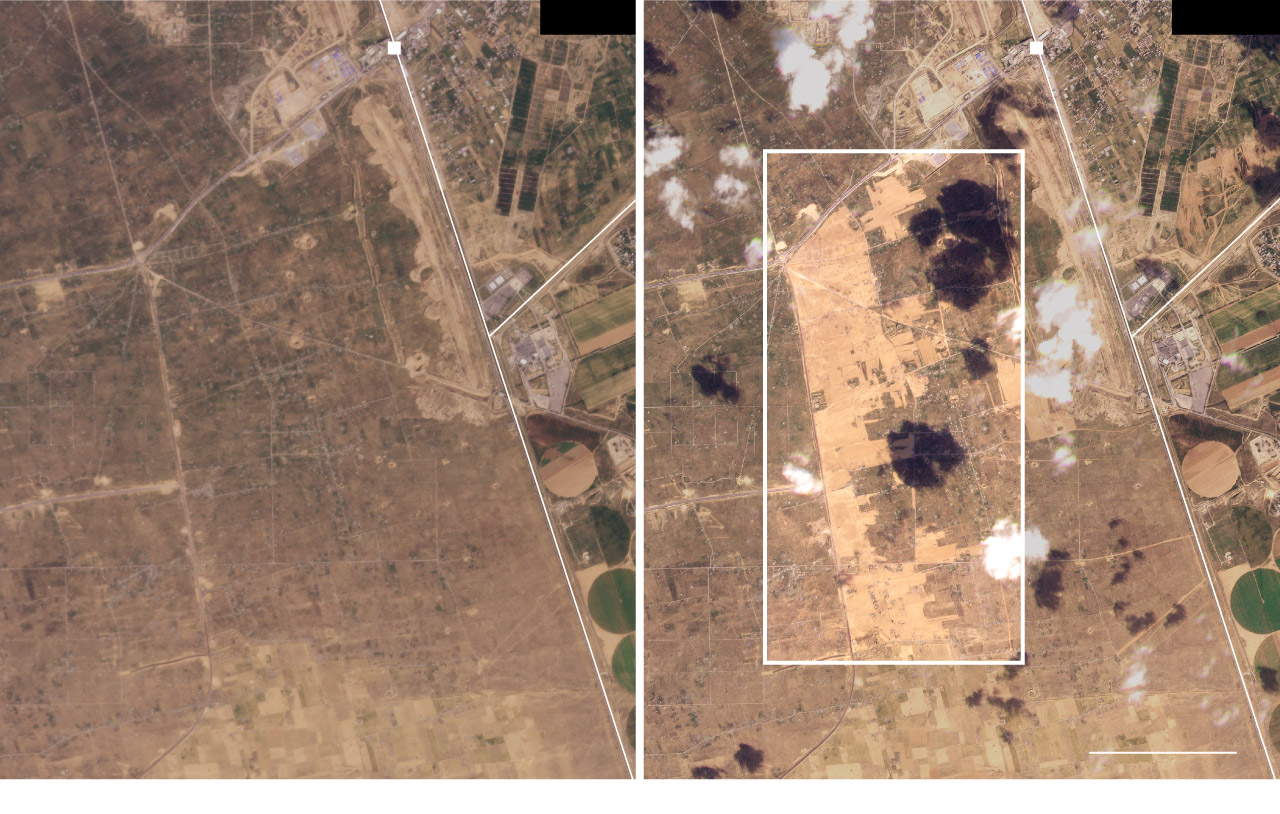
Satellite © Planet Labs 2024
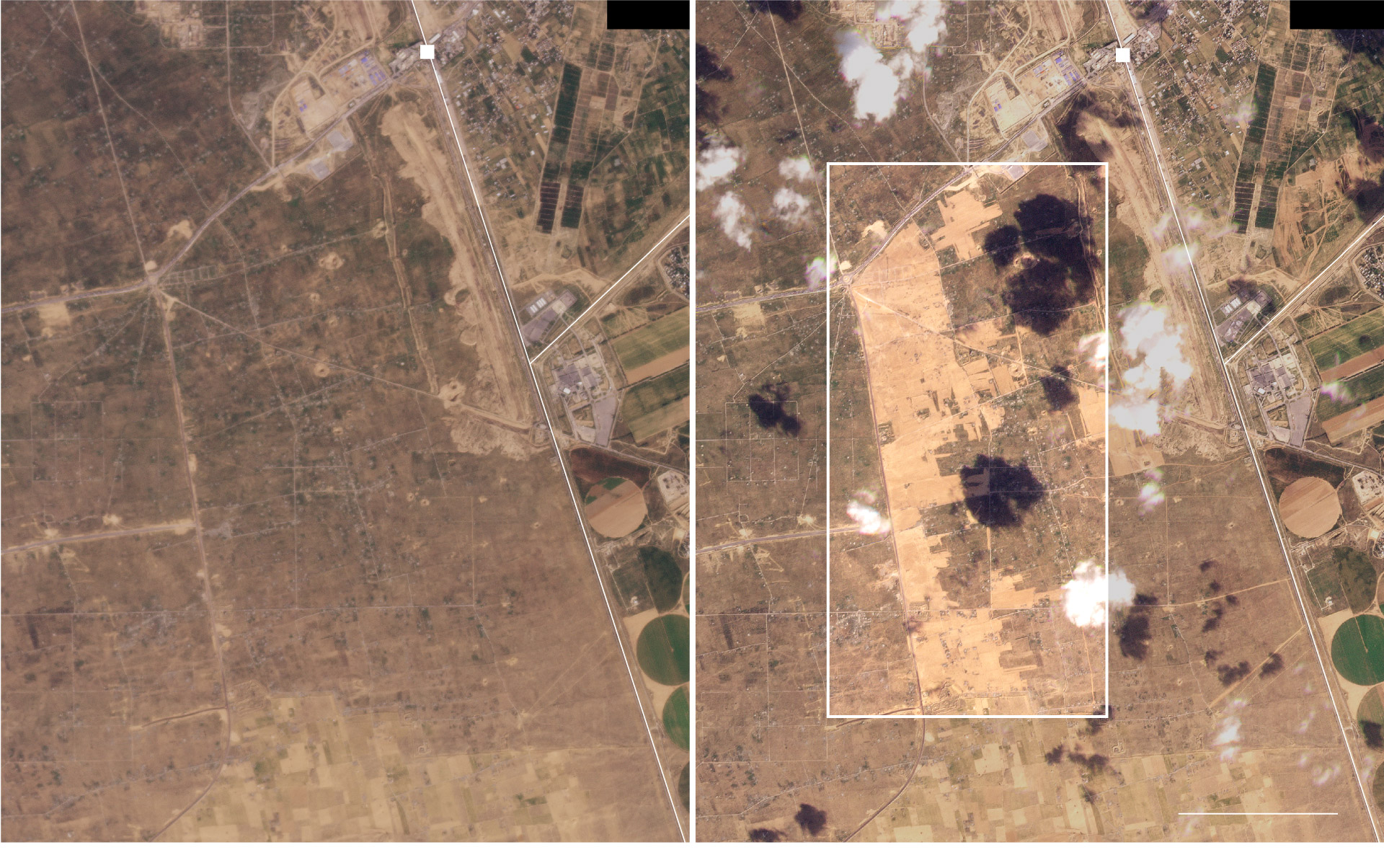
Satellite © Planet Labs 2024
Footage obtained by the organization, and shared exclusively with The Post, shows trucks and bulldozers removing rubble from a rectangular plot of land measuring about 8 square miles adjacent to the Gaza border, with a concrete wall built around its perimeter. The Post verified some of the footage and obtained satellite images that show a 2-square-mile area within that area was cleared between February 5 and 14.
In response to a request for comment, an Egyptian official referred the newspaper to a statement last month by Diaa Rashwan, head of the State Information Service. The statement said: “Egypt has full sovereignty over its land, and has full control over its entire northeastern border, whether with the Gaza Strip or with Israel.”
A former Egyptian official said that despite its public refusal to accept any scenario in which Palestinians are pushed into Egypt, the country is likely to prepare contingency plans.
“If it was a result of the attacks [in Rafah] Tens of thousands of Palestinians are crossing the border. Do you think the Egyptian army will shoot them? They said: The answer is no. “Any responsible government has to think: OK, if we have the worst-case scenario, how are we going to deal with that?”
Parker reported from Cairo and Berger from Jerusalem. Louay Ayoub contributed from Rafah, Hazem Baalousha from Amman, and Hajar Harb from London

